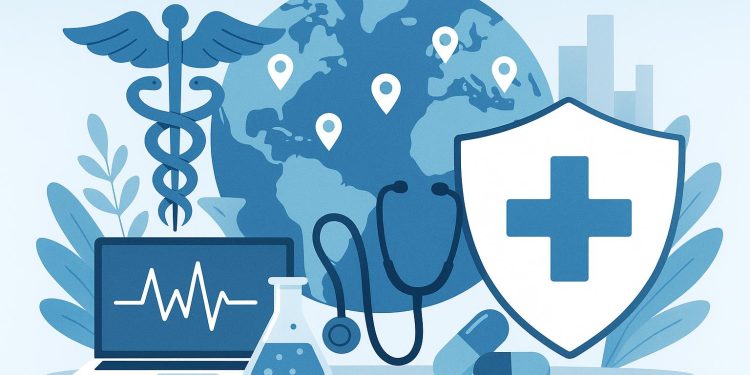Dr. Peter Killcommons, founder and CEO of Medweb, has long championed the integration of telemedicine into global healthcare systems. A physician and entrepreneur, Peter Killcommons earned his MD from New York Medical College and established Medweb in 1992 to enhance medical imaging, telemedicine, and teleradiology capabilities for doctors and hospitals worldwide. Through his leadership, he has supported medical aid missions in regions such as Afghanistan, Haiti, and Peru, where he also provided solar-powered medical equipment and Internet-based diagnostic tools. His commitment to improving access to care and technology aligns closely with ongoing international efforts to strengthen healthcare systems in developing nations, such as Cabo Verde’s continuing progress in expanding equitable medical services.
Cabo Verde Achieves Consistent Healthcare Improvements
Cabo Verde, comprising 10 volcanic islands, is a nation off the coast of West Africa that maintains a universal healthcare system and heavily subsidizes services, with basic coverage provided free or at minimal cost. Its three primary public care facilities are Hospital Agostinho Neto, Hospital Regional de Santiago on Santiago Island, and Hospital Dr. Baptista de Sousa on Sao Vicente Island. Several private medical facilities also exist.
As reported by the World Health Organization (WHO), Cabo Verde had only 13 physicians across its islands in 1975 when it achieved independence, and the average life expectancy was 56. For every thousand births, the mortality rate was a very high 108. Across its half-dozen hospitals, the nation now experiences only 15 infant deaths per 1,000 births, with the life expectancy 71 for men and 79 for women. As the Minister of Health and Social Security describes it, Cabo Verde has accomplished this by adhering to foundational principles of equity, poverty reduction, and the addressing of regional care asymmetries.
Achieving progress has involved concerted efforts in tandem with international organizations. For example, the OECD contributed $6.1 million to the Health Centres Project in 2011. This ambitious initiative brought four new health centers to underserved communities and rehabilitated a fifth. Each center provides 24-hour emergency accessibility to a population ranging from 4,500 to 24,000. Services under one roof include basic medical and preventive care, delivery units, hospitalization wards, and dental care.
International efforts continue to provide vital support to the medical community. In 2025, a radiologic technology/MRI team from Stony Brook University spearheaded a RAD-AID International mission that took life-saving imaging technology and radiographic training to facilities in Cabo Verde. The same year, Chinese government officials transferred a maternity ward constructed at Dr. Baptista de Sousa Hospital to local health providers. This represented the nation’s largest infrastructure project completed in the five decades since independence.
Another aspect of the equation, crucial in an island nation, is telemedicine. Cabo Verde launched a dedicated National Telemedicine Program in 2010, spanning remote consultations, specialized care access, and diagnostic support. For the first time, healthcare professionals regularly used telecommunication and videoconferencing to provide real-time support to patients in remote locations. In 2012, this program was augmented by an International Virtual e-Hospital Foundation “Initiate-Build-Operate-Transfer” initiative aimed at expanding access to specialty care.
A 2021 analysis found 2,442 telemedicine consultations performed across 24 clinical programs from 2014 to 2018. Among the most common consultations were in cardiology, neurology, general surgery, orthopedic surgery, and endocrinology. The overall transfer rate was 34.3 percent, meaning that just over a third of patients served needed to transfer to another hospital to complete care. The report authors lauded this as a significant success story in avoiding often unnecessary and costly patient transfers.
A BMC Health Services Research report published in February 2025 focuses on the general healthcare system. Researchers surveyed 3,445 subjects, of whom 72 percent were women, with an average age of 37.5 years. The results are that user satisfaction with healthcare services is generally high across variables such as facilities, costs, professionals, social action, and administrative services. Satisfaction levels are particularly high among younger and older participants, and among those with higher education.
About Peter Killcommons
Dr. Peter Killcommons is the founder and CEO of Medweb, a San Francisco–based company providing telemedicine, medical imaging, and teleradiology solutions. A cum laude graduate of New York Medical College, he has combined medicine and technology to improve access to healthcare worldwide. Known for his humanitarian work, Dr. Killcommons has led aid missions and donated equipment in regions such as Afghanistan, Haiti, and Peru. An experienced pilot and volunteer, he supports international disaster-response and medical-assistance efforts through organizations including the National Institute for Urban Search and Rescue.







